
by Gideon Marcus
I've said before that IF Worlds of Science Fiction is sort of a poor sister to Galaxy Science Fiction. Since 1959, they've been owned and run by the same team; IF pays its writers less; the quality used to be markedly lower on average (with occasional stand-outs).
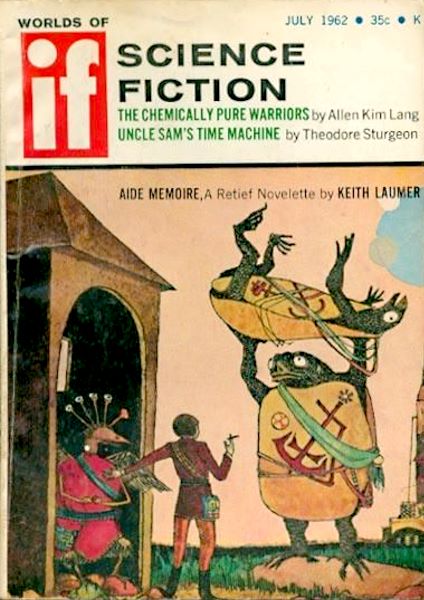
We seem to be entering a new era. The July 1962 IF was a cracking read once I got past the first story, which was short anyway. Not only were the stories fairly original, but even where they weren't, the writing was a cut above. And not in that arty, self-indulgent way that F&SF deems "literary," but in a real way that emphasizes characterization. It's a departure from the mode of the 50s, particularly the lesser mags, where the focus was on the gimmick, with the actors playing second-fiddle to the plot. Plus, Ted Sturgeon has made a permanent home here, which is always a good sign.
So read on – I think you'll enjoy the trip.
Aide Memoire, by Keith Laumer
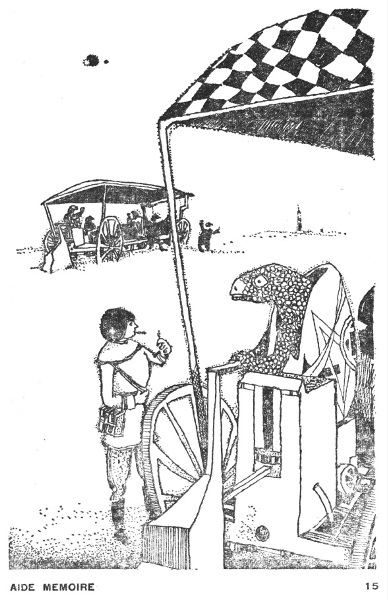
This latest story in the Retief saga is definitely the weak point of the ish. Our omnipotent, long-suffering interstellar diplomat is sent to resolve a violent generational gap amongst a race of turtles. It seems that members of this long-lived race grow shells as they age. The agile young ones have been whipped to an irreverent fervor by humanity's enemy, the Groaci. It's paint-by-numbers satire, and the Retief shtick, when unsupported by an interesting plot, wears thin. Two stars.
From Gustible's Planet, by Cordwainer Smith
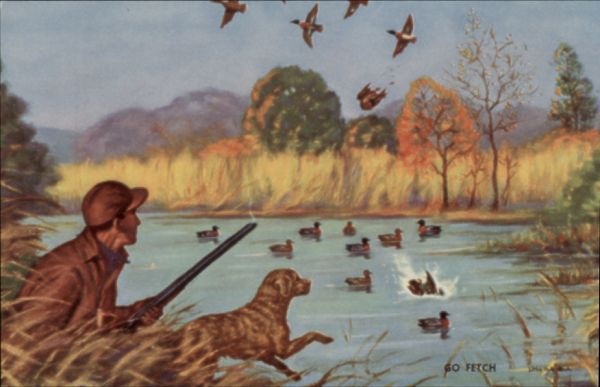
Gluttonous, nigh-invulnerable ducks from another planet invade the Earth. The result is not so much oppression as incessant annoyance. I'm not sure where, or even if, it really fits into his "Instrumentality" universe, though it ostensibly is set there. Anyway, the normally sublime Smith is reduced to offering us what is essentially a one-joke story, but it's Smith, so it's still worth reading. Three stars.
The Chemically Pure Warriors, by Allen Kim Lang
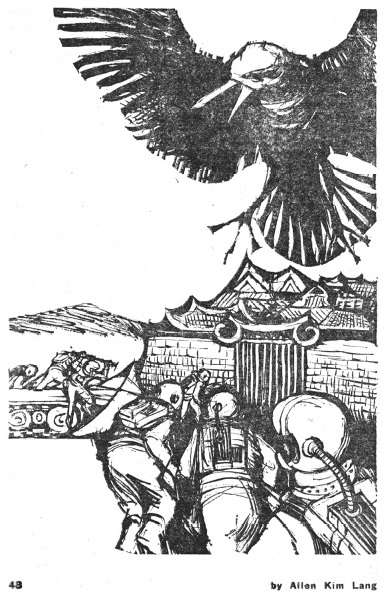
A caste of humans have been bred to be septically pure, as clean of and as vulnerable to bacteria and viruses as any bubble baby. Yet, they have also been trained for generations as humanity's space troopers. Such is their indoctrination that a movement has risen amongst them that they are the superior race, and the "Stinkers" or baseline humans, must ultimately be exterminated.
Warriors takes place on the colony world of Kansas where a battalion of these sterilized soldiers are based in the midst of a Japanese-extracted group of pastoral "Indigenous Humanoids." When one of the troopers attempts to go native, this proves the catalyst for a short-lived but terrible conflict between the two groups.
IF experiments not only with writers and concepts, but with story lengths. The novella just isn't that common a format, but it works nicely here. There is enough time to portray the spit-and-polish roboticism of the soldiers, the gentle Buddhism of the Japanese (the culture and language of whom is reasonably accurately portrayed – I have to wonder if Mr. Lang has spent some time overseas). Warriors owes much to Dickson's Naked to the Stars, or perhaps the time is simply due for a pacifistic sf movement. My favorite passage:
"The ultimate breakdown in communication is silencing one side of the dialogue… That's why killing a man is the ultimate sin; it removes forever the hope of understanding him."
Four stars.
Uncle Sam's Time Machine, by Theodore Sturgeon

Seems old Ted was hosting a bunch of Scouts at his house, and their clocks had run down. All were agog when he dialed into 2500 Khz on his radio and the ticking of the time station, WWV, filled the house. Within 60 seconds, they knew exactly what time it was – to the billionth of a second! Sturgeon was so pleased with the reaction of the boys that he decided to write in to the government to find more about the broadcaster. The goldmine of information they sent him astounded and delighted him, so he passed it onto us.
Now you may feel differently about this article, but I loved it. It doesn't hurt that I am a Ham Radio fanatic, Morse-code fluent, and I tune into WWV (and its Hawaiian counterpart, WWVH) at least weekly. But anyone can appreciate the sheer volume of information the Bureau of Weights and Measures squeezes into those clicks, tones, and messages you can hear if you tune in. And they're improving on the signal all the time. A fine example of our taxpayer dollars at work, and a fun Sturgeon piece to boot. Five stars.
The Recruit, by Bryce Walton
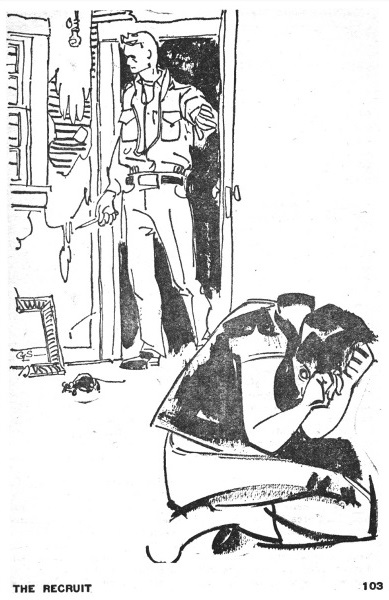
In the near future, a young punk is drafted into a government police force. He swaggers through his role until the time comes to conclude his mission, a mission which is not clearly spelled out until the end. The "teener's" duty is a tantalizing mystery, and the conclusion is well set up. It's a brutal, vivid story by a fellow best known for his decades of pulp tales. Recruit feels kind of like Sheckley on a dark day. Four stars.
All That Earthly Remains, by C. C. MacApp
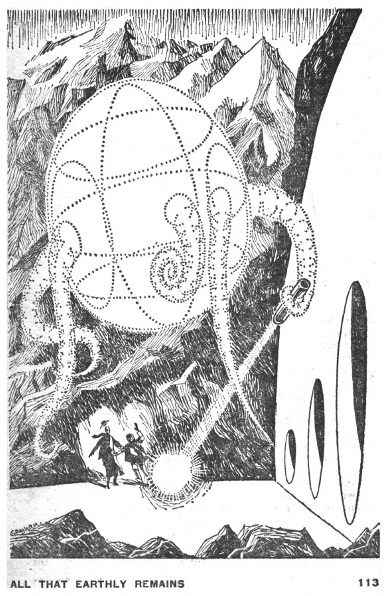
Amid the turmoil of a recent right-wing revolution in an Andean nation, a half-Hispanic American scientist is dispatched to the mountains to investigate a mysterious explosion. The blast has exposed an underground complex, home to fantastic technologies. Are its builders demons? Aliens? Or something more?
Ten years ago, this would have been a simple "gotcha" tale. In MacApp's hands, it's a carrier wave for the interpersonal drama of a handful of the opposing personalities sent to explore the tunnels. The enduring question they are presented – if there is concrete proof of God, will that make us all Atheists? Four stars.
A Bad Town for Spacemen, by Robert Scott
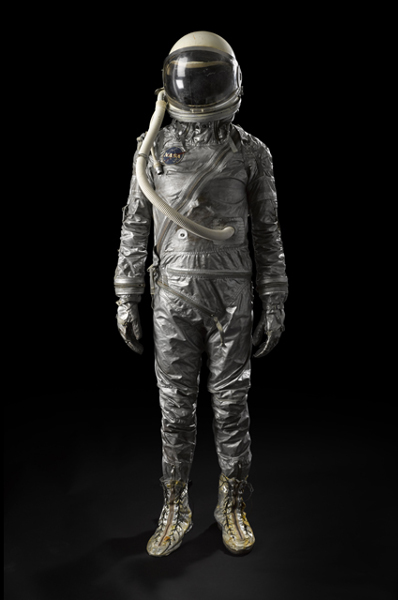
A short, effective piece whose only failing is the rather clumsy expositional bit near the end. But I like the sentiment, the double-meaning, and the otherwise strong implementation. Four stars.
***
So there you have it. An excellent 3.7 star issue, which is only really marred by the truly awful illos, which I suspect are mostly padding for length. Definitely worth subscribing, as Editor Fred Pohl exhorts you to do at the magazine's conclusion. What are you waiting for?
(And don't miss your chance to see the Traveler LIVE via visi-phone, June 17 at 11 AM! A virtual panel, with Q&A, show and tell, and prizes!)
